The city in love with cars even though its air is toxic
- Published
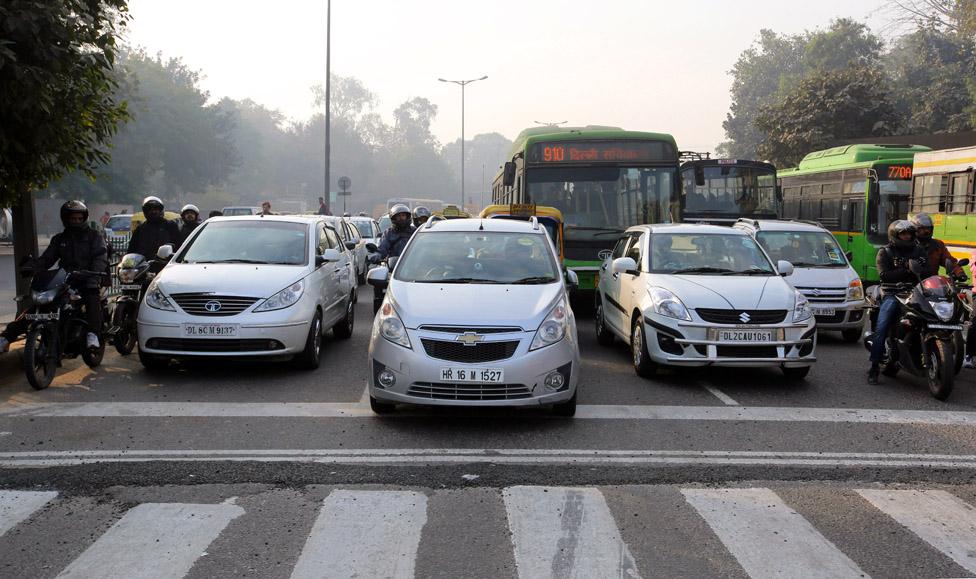
Delhi is a city that adds 1,400 cars to its roads every day - and the minute the local government announced an emergency car rationing plan, the complaints and legal battles began.
Delhi-ites don't like rules. Across north India, there is an utter disdain for traffic regulations.
The experiment - to last just 15 days - meant only cars with odd-numbered plates could drive in Delhi on odd-numbered days, even-numbered cars on even days. Theoretically, traffic and emissions would be cut by half.
But first, women were exempted because of safety issues. According to police, at least five women are raped in Delhi every day.
Then doctors, lawyers and judges lobbied for exemptions - but they were denied.
And, typically, a long list of officials, including India's prime minister, its president, chief justice and opposition leaders were exempted, seemingly making a mockery of the experiment before it even began.
All this, despite the fact that a judge said living in Delhi was like being in a gas chamber.
There were legitimate concerns too.
Many people pointed out that Delhi has too little public transport. There are fewer than 5,000 buses for a population of more than 16 million. London, with half that population, has twice as many buses.
To ease the burden, schools were ordered to remain shut for an extra week.
And drivers of scooters and motorbikes were exempted, despite the fact that they contribute significantly to air pollution.
In the days running up to the experiment, newspapers reported that for as little as 20p (30 US cents), customers could buy stickers to alter number plates.
Clearly, many Delhi-ites didn't see air pollution as their problem.
Amid the controversy, the city's leaders stuck to their guns, insisting that as of 1 January, anyone caught driving on the wrong day would face steep fines. But could such a scheme ever succeed?
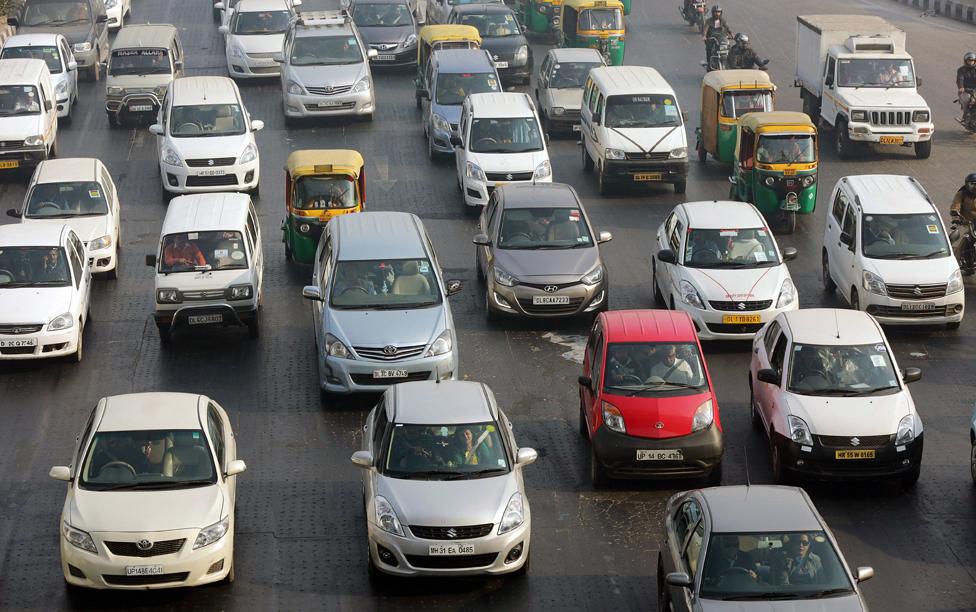
Traffic in Delhi on the first day of the odd-even system, 1 January 2016
A few hours before it all began, I witnessed a traffic jam that exemplified Delhi's bad planning and lawlessness.
My husband and I got caught in a snarl-up unusual even by Delhi's standards.
For 90 minutes, we sat in a logjam surrounded by a thick haze of diesel exhaust, just a few minutes' walk from our flat, on one of Delhi's major north-south thoroughfares.
Police stood by while the rich in their Lamborghinis and BMWs drove against the traffic, some mounting pavements, others blocking intersections, and still others attempting U-turns in the tiniest of gaps.
High-decibel horn blasts rent the air, tyres squealed, and gangs of young men abandoned their vehicles to argue with other drivers.
The result was a traffic jam stretching out in every direction.
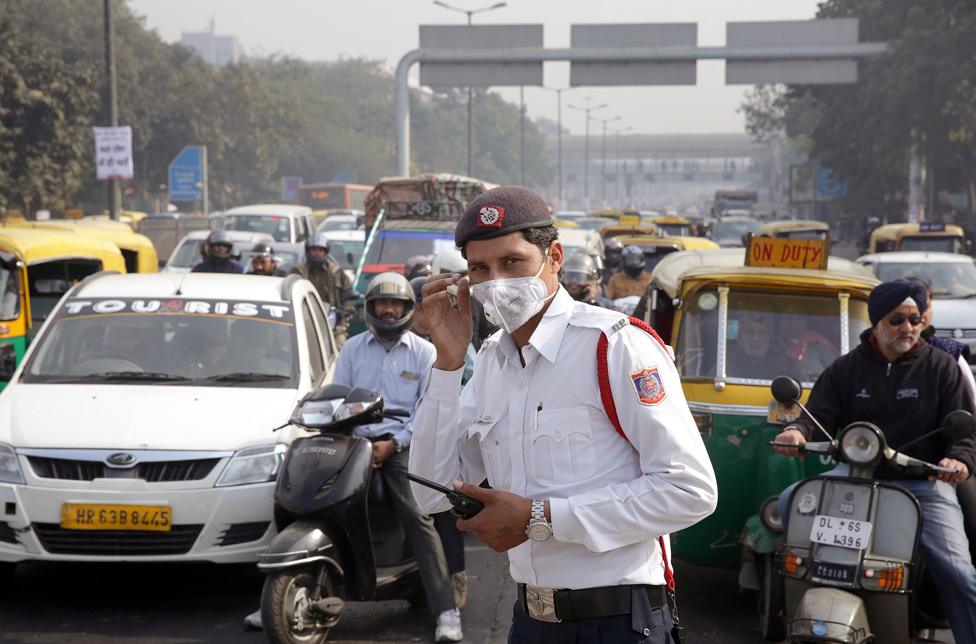
A traffic policeman stands at traffic lights on the first day of the implementation of the scheme
"This road rationing thing is doomed," I told my husband.
But then the first day of 2016 dawned and something entirely unexpected happened. That evening, I went to take a look at the six-lane ring road that encircles Delhi. Apart from a handful of rule-breakers, the number plates were mostly odd-numbered.
Even the next day, and in the days after that, the amount of traffic was hugely reduced. People shared tips on how to carpool or avoid journeys altogether.
Suddenly, a trip across town took 20 minutes rather than the usual 80. We weren't surrounded on all sides by battered cars jostling for position.
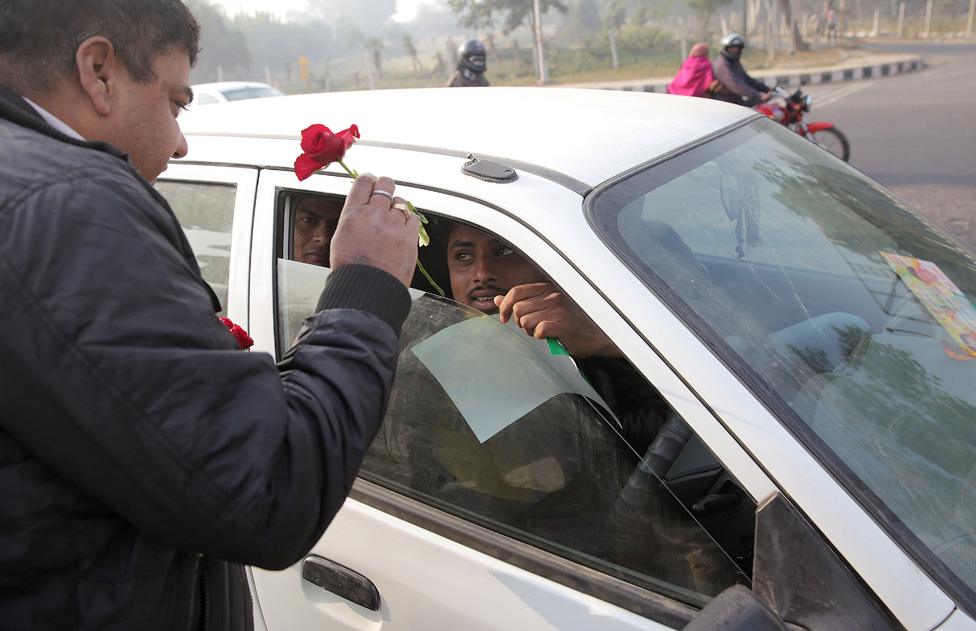
Indian civil defence volunteers distribute roses and encourage commuters to stick to rules
And what a relief - the omnipresent honking had also ebbed. It felt less like 2016 and more like the 1990s, when very few cars plied the roads.
The city's metro system saw a sharp increase in passengers. Buses too were more packed than usual.
All this should have come as a breath of fresh air. But sadly, the pollution readings actually rose that first week to levels beyond what air quality monitors could even register.
As I write this, people across north India are lighting thousands of bonfires for the Punjabi festival of Lohri. The poor continue to burn rubbish to stay warm, adding dioxins, known carcinogens to the air. Cheap coal and diesel across India pump out sulphur dioxide, ash, and fine toxic particles.
Until Delhi - and the rest of India - tackles a sticky web of urban issues such as insufficient public transport, schools and affordable housing, cars will remain central to life here.
The one positive result of Delhi's experiment has been proof that the law can work in India, and that despite their naturally anti-authoritarian instincts, Delhi-ites can be persuaded to change their habits to make their city, once again, a place where you can live… and breathe.

The Magazine on Delhi
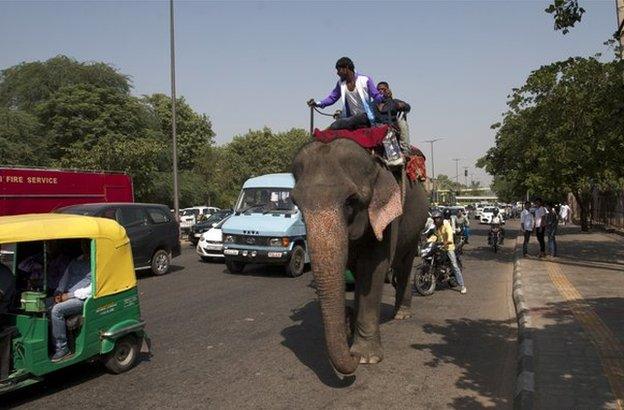
Besides the revving of engines and squealing of brakes, ear drums are hammered by the continuous blast of car horns in Delhi - horns that are drastically louder than the ones sold in Europe or the US. Noise pollution has become so intense it is having a measurable impact on people's health. A study showed that not only is it affecting school children and hospital patients, it is contributing to increased stress and heart disease, and causing the onset of age-related deafness 15 years earlier than normal.
Is Delhi the city with the loudest car horns?
Cows, cobras and monkeys are considered holy by Hindus and you'd be forgiven for thinking their divine status brings them better lives here on earth - in fact, the opposite seems to be true. Perhaps because of perceived mythological powers, these animals are often left to fend for themselves but in a country where growing populations are swallowing up habitat, India's wildlife needs all the help it can get.


How to listen to From Our Own Correspondent, external:
BBC Radio 4: Saturdays at 11:30. Listen online or download the podcast.
BBC World Service: At weekends - see World Service programme schedule or listen online.
Subscribe to the BBC News Magazine's email newsletter to get articles sent to your inbox.